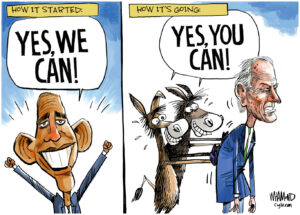Secret Intelligence Court a Precursor to Tyranny
The justification for this secret court -- as is usual in the development of 20th century secret police states -- is national security.The current of awkward revelations concerning the clandestine or publicly misrepresented practices of the present and recent American administrations goes on. A long exposition in the New York Times and International Herald Tribune from July 8 concerns a widely unknown American secret court dealing with intelligence actions. The court decides whether certain actions are or are not legal, issues its rulings in secret and creates a new body of American law (or lawlessness, when it contravenes established public and constitutional law, which it is accused of doing). This is the Foreign Intelligence Surveillance Court.
The justification for this secret court — as is usual in the development of 20th century secret police states — is national security. The American case differs from the prominent earlier examples of such states in Bolshevik Russia and Nazi Germany, in that this American secret court operates behind a screen of what seem to be guilty obfuscations, which their authors know will not stand up to serious examination. Such obfuscations simply provide the rationales for concealment of this legal mechanism from public, press, and all but a certain number of congressmen and senators, all willing to provide the simulacrum of oversight because of their personal commitment to the belief that the United States makes itself secure by walking on what former Vice President Richard Cheney melodramatically described as “the dark side.”
It is the public who gets left in the dark about this, so as to protect the system.
The “dark side” of international combat or security operations, such as political assassinations, kidnappings, use of torture, or secret and illegal sequestrations or imprisonments, has on the whole seemed to have produced more American national humiliation, disrepute,and political blowback than advantage. It also is not entirely new; it is a characteristic of bureaucracies.
When Lyndon Johnson became president in 1963, he said that he found the United States operating a “Murder Incorporated” in the Caribbean, in connection with Washington’s attempt to destroy the Fidel Castro government in Cuba. Senate hearings followed, as did disgrace and frowning editorials in the press. But today, here we are again building a bigger and better international apparatus of illegality, subversion of international law and clandestine grotesqueries than ever before, as well as the judicial apparatus of a secret state. And if anyone complains among our “allies” or satellite nations, which the West Europeans seem to have become, our ambassador rings up and has a word with them, and then they grovel.
Why should this be so in an American nation historically and constitutionally committed to the rule of law? In which most of the temporarily appointed officers of government in such an administration as that of President Barack Obama (sometime lecturer in constitutional law at the University of Chicago), and many members of the permanent civil service of American government, are usually lawyers, while lawyers make up the single largest professional group in the United States Congress, as well as in a great many state legislatures.
It is astonishing that no one or no group of these professionals, sworn to defend the American Constitution, seems to have felt an obligation to make public the existence of this secret system of law courts. Perhaps the proliferation of lawyers simply promotes the number and ingenuity of acts of lawlessness in government. Criminal gang leaders always need their consigliere, according to novels and movies.
The existence of this secret system in the American justice establishment lacks both effective oversight and institutionalized contestation. It judges itself, which means that it does what governmental superiors want of it, or pursues its own inherent dispositions, which, as in nearly all matters concerning power, means aggrandizement and institutionalization.
The effect of this is sinister and subversive of justice and democracy since this court has been created to deal secretly with large issues of American foreign policy and internal security.
Its rulings nearly always favor expansion of government power, tend to set legal precedents that may be of constitutional importance, and are rarely effectively contested or appealed since there is no one to challenge them in order to force them to a higher level of adjudication.
The New York Times report emphasizes the importance of this court to the expanded power of the National Security Agency, which provoked an international scandal when revealed to the press in recent days by Edward Snowden. The key to expanded power is “special needs” — the court’s generalization to a larger sphere of legal provisions originally granted to minor “special needs.” For example, a Supreme Court decision in 1989 allowed railroad workers to be drug-tested, in violation of their right to personal privacy, in order (in the court’s view) to meet “an overriding public danger.”
From this, the 11-member secret Foreign Intelligence Surveillance Court ruled that the NSA could (as it does) collect and examine Americans’ (and others’) private communications in a search for terrorists without violating the Fourth Amendment of the Bill of Rights, which guarantees citizens protection from unreasonable searches and seizures. Critics say this unreasonably uses a narrow and relatively uncontroversial issue to apply secretly to the huge area of private communications.
From such decisions, as we know, comes tyranny.
Visit William Pfaff’s website for more on his latest book, “The Irony of Manifest Destiny: The Tragedy of America’s Foreign Policy” (Walker & Co., $25), at www.williampfaff.com.
© 2013 Tribune Media Services, Inc.
Your support matters…Independent journalism is under threat and overshadowed by heavily funded mainstream media.
You can help level the playing field. Become a member.
Your tax-deductible contribution keeps us digging beneath the headlines to give you thought-provoking, investigative reporting and analysis that unearths what's really happening- without compromise.
Give today to support our courageous, independent journalists.








You need to be a supporter to comment.
There are currently no responses to this article.
Be the first to respond.